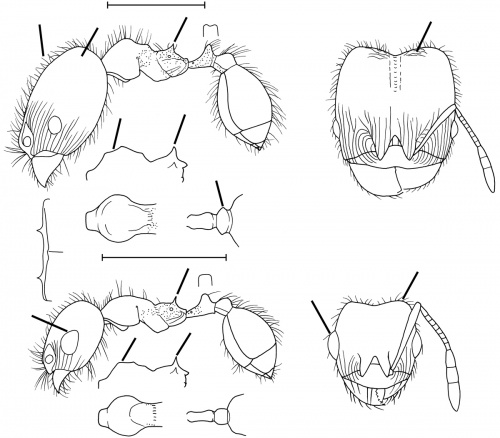Pheidole bajaensis
| Pheidole bajaensis | |
|---|---|

| |
| Scientific classification | |
| Kingdom: | Animalia |
| Phylum: | Arthropoda |
| Class: | Insecta |
| Order: | Hymenoptera |
| Family: | Formicidae |
| Subfamily: | Myrmicinae |
| Tribe: | Attini |
| Genus: | Pheidole |
| Species: | P. bajaensis |
| Binomial name | |
| Pheidole bajaensis Wilson, 2003 | |
Nothing is known about the biology of bajaensis.
Identification
See the description in the nomenclature section.
Keys including this Species
Distribution
Known only from Baja California Sur; possibly a geographic variant of xerophila. (Wilson 2003)
Latitudinal Distribution Pattern
Latitudinal Range: 26.875° to 26.859°.
| North Temperate |
North Subtropical |
Tropical | South Subtropical |
South Temperate |
- Source: AntMaps
Distribution based on Regional Taxon Lists
Neotropical Region: Mexico (type locality).
Distribution based on AntMaps
Distribution based on AntWeb specimens
Check data from AntWeb
Countries Occupied
| Number of countries occupied by this species based on AntWiki Regional Taxon Lists. In general, fewer countries occupied indicates a narrower range, while more countries indicates a more widespread species. |

|
Estimated Abundance
| Relative abundance based on number of AntMaps records per species (this species within the purple bar). Fewer records (to the left) indicates a less abundant/encountered species while more records (to the right) indicates more abundant/encountered species. |

|
Biology
Castes
Worker
Minor
Images from AntWeb
   
| |
| Holotype of Pheidole bajaensis. Worker. Specimen code casent0172965. Photographer April Nobile, uploaded by California Academy of Sciences. | Owned by MCZ, Cambridge, MA, USA. |
Nomenclature
The following information is derived from Barry Bolton's Online Catalogue of the Ants of the World.
- bajaensis. Pheidole bajaensis Wilson, 2003: 559, figs. (s.w.) MEXICO.
Unless otherwise noted the text for the remainder of this section is reported from the publication that includes the original description.
Description
DIAGNOSIS Close to and possibly conspecific with Pheidole yaqui, differing as follows.
Major: occiput rugulose from the midline partly out to the occipital corners; postpetiole laterally subangulate seen from above; margins of anterior half of pronotum not transversely carinulate.
Minor: humerus in dorsal-oblique view less angulate and occipital lobes in full-face view more so, and propodeal spines longer. Together, bajaensis and yaqui differ from gilvescens and xerophila in the major’s head shape, which in side view is rounded (not flattened) in the dorsal profile of its posterior half, and the failure of the head to taper toward the occiput; other traits exist in major and minor as shown. Philip Ward (personal communication) has pointed out that yaqui and bajaensis are joined by intermediates in the degree of occipital rugulation, forming what appears to be a southward cline on Baja. He recommends treating the two forms as one species. Ward may be right, but I have hesitated to unite the two forms in view of the presence of other defining traits described here in the Diagnosis.
MEASUREMENTS (mm) Holotype major: HW 1.22, HL 1.26, SL 0.64, EL 0.24, PW 0.52. Paratype minor: HW 0.54, HL 0.60, SL 0.52, EL 0.20, PW 0.32.
COLOR Major: body and appendages medium yellow except mandibles, which are dark yellow.
Minor: body and appendages medium yellow.
Figure. Upper: holotype, major. Lower: paratype, minor. Scale bars = 1 mm.
Type Material
BAJA CALIFORNIA SUR, MEXICO: 50 km south-southwest of San Ignacio, 26°52'N 113°08'W, col. Philip S. Ward. Museum of Comparative Zoology
Etymology
L bajaensis, named after the Mexican state of origin.
References
- Wilson, E. O. 2003. Pheidole in the New World: A dominant, hyperdiverse ant genus. Harvard University Press, Cambridge, MA. (page 559, fig. major, minor described)
References based on Global Ant Biodiversity Informatics
- Vasquez-Bolanos M. 2011. Checklist of the ants (Hymenoptera: Formicidae) from Mexico. Dugesiana 18(1): 95-133.
- Vásquez-Bolaños M. 2011. Lista de especies de hormigas (Hymenoptera: Formicidae) para México. Dugesiana 18: 95-133
- Wilson, E.O. 2003. Pheidole in the New World: A Dominant, Hyperdiverse Genus. Harvard University Press



